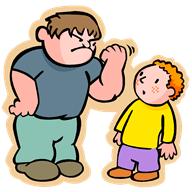Bullying
Bullying may not stop unless you tell someone who can help. We know that bullying goes on in and out of school and parents, carers, teachers and other professionals have a duty to take action if they suspect or discover that a child or children are being bullied.
Bullying can include:
- people calling you names
- making things up to get you into trouble
- hitting, pinching, biting, pushing and shoving
- taking things away from you
- damaging your belongings
- stealing your money
- taking your friends away from you
- cyberbullying
- spreading rumours
- threats and intimidation
- making silent or abusive phone calls
- people frightening you so that you don't want to go to school, so that you pretend to be ill to avoid them
Are you being bullied or do you know someone who is being bullied?
- Talk to your parent or an adult in your family
- Talk to a teacher, adult family friend or neighbour
- Get advice
Are you a bully?
- Maybe your mates think it’s ok, they might encourage you or laugh about it, but it’s not ok
- You are hurting someone else because you want to, and they don’t deserve it
- You could be responsible for someone killing themselves – nearly 20 people a year kill themselves because they can’t stand being bullied
- You should stop. If you can’t stop, get some advice
- Talk to a trusted adult about it
How to get help
Over the years Bullying UK has been sent tips on how to deal with bullying by young people who were experiencing it. Look at Bullying UK to see what they say.
Also, if you look at the young people section you can find information on:
- bullying outside school
- racist bullying
- bullying in sport




